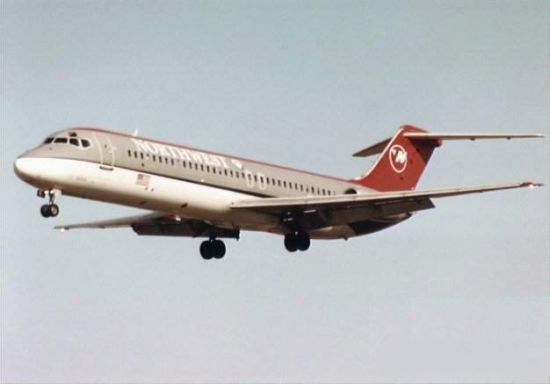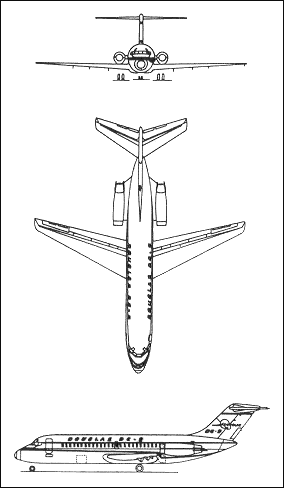|
||||||||||
|
|
||||||||||
|
||||||||||
|
|
||||||||||
 - -
|
|

|
Douglas DC-9 Short to Medium-Range Jetliner |
|
DESCRIPTION:
Douglas began development of the DC-9 in the late 1950s as a jet-powered short-range aircraft to complement its larger DC-8. Although the DC-9 was the first American design to feature the rear-mounted twin podded engines common to the design family, Douglas borrowed the concept from the French Caravelle airliners. Otherwise, the configuration was of a generally traditional layout with a tubular fuselage mated to a low-mounted swept wing. One unusual characteristic was the introduction of a T-tail necessitated by the choice of engine placement. The 80 to 90 passenger DC-9 Series 10 was the first to enter service, but this basic design was offered in a number of variations made possible by the addition of fuselage plugs for increased passenger or fuel loads. The final Series 50 variant, for example, was some 23 ft (7 m) longer than the original and could carry up to 139 passengers. In addition, several dedicated cargo, convertible, and combined cargo and passenger variants were developed to attract a variety of operators. The program also received a great boost when the US Air Force and US Navy purchased cargo and transport variants known as the C-9. A much larger and re-engined variant, known as the DC-9 Super 80, appeared in the early 1980s but was redesignated the MD-80 following the merger of Douglas with McDonnell. Between 1965 and 1982, a total of 976 DC-9s were built, and many remain in service having been upgraded to meet new noise regulations.
Last modified 11 April 2011
|
|
| HISTORY: | |
| First Flight | 25 February 1965 |
|
Service Entry
|
8 December 1965 (with Delta Air Lines)
|
| CREW: |
two flight crew: pilot, co-pilot
|
| PASSENGERS: |
(DC-9-10) 80 in two classes, 90 in one class (DC-9-30) 105 in two classes, 119 in one class (DC-9-40) 125 to 132 (DC-9-50) up to 139 |
|
ESTIMATED COST:
|
unknown
|
| AIRFOIL SECTIONS: | |
| Wing Root | DSMA-433/-434A |
|
Wing Tip
|
DSMA-435A/-436A
|
| DIMENSIONS: | |
| Length |
(DC-9-10) 104.42 ft (31.86 m) (DC-9-30) 119.33 ft (36.41 m) (DC-9-40) 125.58 ft (38.31 m) (DC-9-50) 133.50 ft (40.73 m) |
| Wingspan |
(DC-9-10) 89.42 ft (27.28 m) (DC-9-20) 93.32 ft (28.47 m) |
| Height | 27.5 ft (8.38 m) |
| Wing Area | 1,000.7 ft² (92.97 m²) |
|
Canard Area
|
not applicable
|
| WEIGHTS: | |
| Empty |
(DC-9-30) 57,190 lb (25,940 kg) (DC-9-50) 61,880 lb (28,070 kg) |
| Normal Takeoff | unknown |
| Max Takeoff |
(DC-9-10) 90,700 lb (41,180 kg) (DC-9-20) 98,000 lb (44,490 kg) (DC-9-30) 110,000 lb (49,940 kg) (DC-9-40) 114,000 lb (51,755 kg) (DC-9-50) 121,000 lb (54,935 kg) |
| Fuel Capacity |
internal: (DC-9-10) 3,695 gal (13,980 L) (DC-9-20) 3,680 gal (13,925 L) (DC-9-50) 4,260 gal (16,120 L) external: not applicable |
|
Max Payload
|
(DC-9-30) 31,125 lb (14,120 kg)
|
| PROPULSION: | |
| Powerplant |
(DC-9-10) two Pratt & Whitney JT8D-7 turbofans (DC-9-20) two Pratt & Whitney JT8D-9 turbofans (DC-9-30) two Pratt & Whitney JT8D-15 turbofans (DC-9-50) two Pratt & Whitney JT8D-17 turbofans |
| Thrust |
(DC-9-10) 28,000 lb (124.56 kN) (DC-9-20) 30,000 lb (133.45 kN) (DC-9-30) 31,000 lb (137.90 kN) (DC-9-50) 32,000 lb (142.35 kN) |
| PERFORMANCE: | |
| Max Level Speed |
at altitude: unknown at sea level: unknown cruise speed: (DC-9-10) 560 mph (905 km/h) (DC-9-20) 555 mph (895 km/h) (DC-9-30) 570 mph (915 km/h) (DC-9-40) 560 mph (905 km/h) (DC-9-50) 560 mph (905 km/h) |
| Initial Climb Rate | unknown |
| Service Ceiling | unknown |
| Range |
(DC-9-10) 1,100 nm (2,035 km) (DC-9-20) 1,605 nm (2,975 km) (DC-9-30) 1,420 nm (2,630 km) (DC-9-40) 1,460 nm (2,710 km) (DC-9-50) 1,420 nm (2,630 km) |
| g-Limits |
unknown
|
| KNOWN VARIANTS: | |
| DC-9 Series 10 | Initial production model |
| DC-9 Series 15 | Same as DC-9-10 but with more powerful engines for operation at higher gross weights |
| DC-9 Series 20 | Model with larger wingspan and more powerful engines for operation in hot/high environments; 147 Series 10, 15 and 20 airframes built |
| DC-9 Series 30 | Enlarged version with lengthened fuselage for up to 119 passengers and larger sing of Series 20 plus more powerful engines, available in freighter (F), convertible (CF) and passenger/freight (RC) models; 621 built |
| DC-9 Series 40 | Same as Series 30 but with lengthened fuselage for up to 132 passengers and new engines, available in freighter (F), convertible (CF) and passenger/freight (RC) models; 71 built |
| DC-9 Series 50 | Same as Series 30 but with lengthened fuselage and revised cabin layout for up to 139 passngers and new engines, available in freighter (F), convertible (CF) and passenger/freight (RC) models; 96 built |
| DC-9 Super 80 | Lengthened model with more fuel efficient engines, later redesignated the MD-80 |
| DC-9 Super 90 | Updated version of the MD-80, later redesignated the MD-90 |
| C-9A Nightingale | Aeromedical transport based on DC-9 Series 30 and used by US Air Force; 21 built |
| C-9B Skytrain II | Logistics transport based on Series 30 and Series 40 built for US Navy and US Marines; 17 built |
| VC-9 |
US Air Force VIP transport based on DC-9 Series 30; 3 built
|
| KNOWN OPERATORS: | |
| Civil |
1Time ABX Air ADC Airlines Adria Aero California Aerocaribe Aerolineas Internacionales Aeromexico Aeropostal Aeroquetzal Aerorepublica Colombia Air Aruba Airborne Express Air Canada Air Djibouti Airtran Airways Air Transport International (ATI) Air West Alitalia Allegheny Airlines Allegiant Air Allegro Air ALM Aserca Austral Avensa Aviaco Aviacsa Avioimpex Bellview Airlines Cebu Pacific Air Championship Airways Continental Airlines Delta Air Lines DHL Dinar Lineas Aereas Dominicana Eastern Airlines Egyptair Emery Worldwide Evergreen International Airlines Express One International Finnair Garuda Indonesia Ghana Airways Hawaiian Air Hughes Airwest Hunair Iberia Inex Adria Intercontinental Colombia Itavia Japan Air System JAT Yugoslav Airlines Kitty Hawk Air Cargo Laser Legend Airlines MAT Macedonian Airlines Merpati Midway Airlines Midwest Express Million Air North Central Airlines Northwest Airlines Ozark Airlines Reliant Airlines Ryan International Airlines SAS Scandinavian Airlines Servivensa Setra Sosolito Southern Airways Southwest Airlines Spantax Spirit Airlines Sportsflight Air Sun Air Sun Jet International Airlines Surinam Airways Taesa Texas International THY Turkish Airlines Toa Domestic Airlines (TDA) Trans World Airlines (TWA) US Airways USA Jet Airlines Valujet Viasa West Coast Airlines Wetrafa Airlines Zuliana Airlines |
| Government/Military |
Italy, Aeronautica Militare Italiana (Italian Air Force) Kuwait, al-Quwwat al-Jawwiya al-Kuwaitiya (Kuwaiti Air Force) United States (US Army Air Force) United States (US Marine Corps) United States (US Navy) |
|
3-VIEW SCHEMATIC:

|
|
SOURCES:
|
|


|
Aircraft | Design | Ask Us | Shop | Search |

|
|
| About Us | Contact Us | Copyright © 1997-2023 | |||
|
|
|||